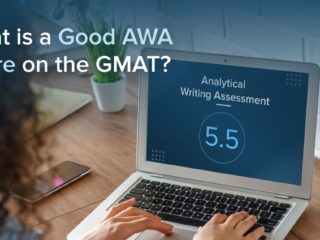Last Updated on March 25, 2022
Most GMAT test-takers set a goal for their total GMAT score pretty early on in their GMAT journey — in fact, it’s advisable to do so. The tricky part comes when they have to figure out specific goals for their GMAT section scores. In particular, setting a GMAT Verbal score goal can be tough because students often aren’t sure just how important Verbal scores are for admission to business school.
In this article, I’ll give you the lowdown on what is considered a good GMAT Verbal score, what the average GMAT Verbal score is, and how business schools tend to view Verbal scores when assessing GMAT performance overall. I’ll also give you some tips for determining what your target score should be on the Verbal section and discuss what kind of Verbal score you may need to earn a seat at a top business school.
First, let’s do a quick rundown of how the GMAT is scored and review the GMAT Verbal score range and percentile rankings.
- How Is the GMAT Scored?
- GMAT Verbal Percentile Rankings
- Do I Need a High Verbal Score for Business School?
- What Is an Average vs. Good GMAT Verbal Score?
- How to Determine Your GMAT Verbal Score Goal
How Is the GMAT Scored?
As you may already know, after you sit for the GMAT, you actually receive 5 different scores: an individual score for each of the 4 GMAT sections — Quant, Verbal, Integrated Reasoning (IR), and Analytical Writing Assessment (AWA) — and your total GMAT score. Your total score factors in your performance in the Quant and Verbal sections, while your IR and AWA scores are not used in the calculation of your total score.
Specifically, your Quant and Verbal section scores will each fall with a 6 to 51 score range, and you’ll receive a total score that falls within a range from 200 to 800. For reference, let’s review the 5 GMAT score scales:
- Total Score: 200 to 800
- Quant Score: 6 to 51
- Verbal Score: 6 to 51
- IR Score: 1 to 8
- AWA Score: 0 to 6
Interestingly, although there are 5 more questions in the Verbal section of the GMAT than there are in the Quant section (36 vs. 31, respectively), your Quant and Verbal performances are weighted equally in calculating your total GMAT score.
KEY FACT:
Your performances in the Quant and Verbal sections are used to calculate your total GMAT score, with each section carrying equal weight.
For a detailed breakdown of how the GMAT is scored, check out this article on the GMAT scoring algorithm.
For now, let’s take a look at the GMAT Verbal score percentile rankings and what they mean.
GMAT Verbal Percentile Rankings
Every GMAT score you receive is associated with a percentile ranking. Your percentile rankings tell you how your scores stack up against the scores of your competition.
For instance, say you score 47 on the Verbal section. As you’ll see in the chart below, that score puts you in the 99th percentile for GMAT Verbal, meaning that you scored better than 99% of all GMAT test-takers worldwide in Verbal.
Percentile rankings are based on the scores of all GMAT test-takers in the most recent 3-year period that GMAC (the test-maker) has collected data for. The current rankings are based on the scoring data of the 695,794 test-takers who took the GMAT during the period from January 2017 through December 2019. Let’s take a look.
| GMAT Verbal Score | |
|---|---|
| Score | Percentile Ranking |
| 51 | 99% |
| 50 | 99% |
| 49 | 99% |
| 48 | 99% |
| 47 | 99% |
| 46 | 99% |
| 45 | 99% |
| 44 | 98% |
| 42 | 96% |
| 41 | 94% |
| 40 | 90% |
| 39 | 89% |
| 38 | 85% |
| 37 | 82% |
| 36 | 80% |
| 35 | 76% |
| 34 | 71% |
| 33 | 68% |
| 32 | 66% |
| 31 | 61% |
| 30 | 58% |
| 29 | 56% |
| 28 | 51% |
| 27 | 46% |
| 26 | 43% |
| 25 | 38% |
| 24 | 36% |
| 23 | 32% |
| 22 | 30% |
| 21 | 26% |
| 20 | 22% |
| 19 | 19% |
| 18 | 17% |
| 17 | 14% |
| 16 | 12% |
| 15 | 10% |
| 14 | 9% |
| 13 | 7% |
| 12 | 5% |
| 11 | 3% |
| 10 | 2% |
| 9 | 2% |
| 8 | 1% |
| 7 | 1% |
| 6 | 0% |
What do these rankings tell us? Well, for one, Verbal scores above 44 are rare — notice that any Verbal score in the 45 to 51 range puts you in the top 1% of all GMAT test-takers. Even a score of 44 is pretty uncommon — that puts you in the top 2%. And we can see that a Verbal score of 40 or more will land you in the top 10% of all test-takers.
The upshot of this data is that it’s relatively difficult to earn a really high score in GMAT Verbal. After all, if earning a top Verbal score were easy, more GMAT test-takers would be doing it.
KEY FACT:
Your percentile ranking tells you how your Verbal score compares with those of all GMAT test-takers in a recent 3-year period.
Of course, the next question you may be asking is, do you actually need a high Verbal score for admission to MBA programs?
Do I Need a High Verbal Score for Business School?
If you want to earn a high GMAT score overall, your safest bet is to spend ample time preparing for both the Quant and Verbal sections of the exam. However, it’s no secret that MBA programs tend to be highly quant-driven. So, many GMAT test-takers wonder whether business schools really “care” about Verbal scores.
As I’ll discuss more shortly, the GMAT scores you need depend on which schools you’re applying to and what your applicant profile is overall. However, business schools do typically prefer to see “balanced” GMAT section scores as opposed to wildly divergent ones. Yes, it’s true that MBA programs generally have a higher standard for Quant performance than for Verbal performance. And in general, MBA programs will respond more warmly to a great Quant score and an average Verbal score than to the reverse. Nevertheless, you still need to be able to demonstrate management-level reading, writing, and grammar skills.
The importance of business writing and reading comprehension skills for MBA programs should not be underestimated. For analyzing case studies and for graduate coursework in general, the ability to read, process, and analyze information in a limited amount of time is crucial, since the pace of learning is so quick. So, if your GMAT section scores are all over the map, or you perform well in Quant but tank in Verbal, admissions committees may wonder whether you have what it takes to tackle graduate-level coursework.
Moreover, as I already mentioned, your Verbal score has a somewhat greater impact on your total GMAT score than your Quant score has. So, neglecting your Verbal study and expecting to earn a high total score regardless is not a prudent strategy. Particularly if you are targeting top MBA programs, you likely will need a very good score in both Quant and Verbal in order to earn a competitive total GMAT score.
Now, keep in mind that a very good score in Verbal is different from a very good score in Quant, so “balanced” section scores won’t necessarily match. That is where those score percentiles will come in handy. For example, most top MBA programs prefer to see a GMAT Quant score of at least 47, which translates to the 60th percentile in Quant. That means that 40% of the people who sit for the GMAT can hit that target. A 47 in Verbal, however, is an uncommon score that puts a test-taker in the top 1%. So, a Q47/V47, while it may look balanced, actually shows a strong performance in Quant and an outstanding one in Verbal.
Luckily, top business schools don’t expect all of their students to be in the top 1% in Verbal. Of course, if your Verbal score dips too low, then your total GMAT score will probably miss the mark.
TTP PRO TIP:
Don’t expect to earn a high total GMAT score by neglecting Verbal and focusing solely on Quant.
With all of that in mind, let’s take a look at how business schools generally view different Verbal score ranges.
What Is an Average vs. Good GMAT Verbal Score?
Based on the 2017-2019 scoring data we looked at earlier, GMAC calculated the mean (average) GMAT Verbal Score of all test-takers as 27.11. So, a Verbal score of 27 or 28 would indicate that you scored better than roughly half of all GMAT test-takers did, but also worse than roughly half of all test-takers did. In other words, you’d be smack in the middle of the pack.
Of course, smack in the middle of the pack for test-takers worldwide is not necessarily the same as “middle of the pack” for your target schools. A GMAT Verbal score that is considered average or good at one school may be below average (or excellent) at another.
Furthermore, what is considered a “good” Verbal score is different for every MBA applicant, because every MBA applicant has a different background and profile. If you’re a liberal arts major with little quantitative experience, schools may scrutinize your Quant score particularly closely. If you’re an accounting major who works in finance, schools might give your Verbal score a second look to assess whether you have the full range of skills necessary to succeed in the first year of an MBA program.
The fact is, there is no one-size-fits-all answer to the question of what a good GMAT Verbal score is. At the most basic level, a good GMAT Verbal score is one that gets you to the total score you need for the MBA programs you’re targeting. Furthermore, if your targeted schools publish the median or average GMAT Verbal scores of their incoming classes (not all schools do), then you’ll have a better sense of where the “middle of the pack” and the “head of the pack” are at those schools.
TTP PRO TIP:
In general, a good GMAT Verbal score is one that gets you to the total score you need for the MBA programs you’re targeting and meets the incoming class average or median Verbal scores (if published).
Of course, given the average score of recent GMAT test-takers, we do have some idea which Verbal scores are generally considered good, great, or not so great. Those score ranges can be useful in determining what Verbal score to shoot for when starting your GMAT prep. So, let’s look at how various GMAT Verbal score ranges are generally regarded in the business school admissions landscape.
So, generally speaking, if you score in the upper 30s, you should have a competitive Verbal score for a wide range of MBA programs. A score of 36, for example, places you in the 80th percentile, meaning that you scored in the top 20% in Verbal. A score of 38 places you in the 85th percentile, meaning that you scored in the top 15%.
If, on the other hand, you earn a Verbal score in the low 30s or upper 20s, you’ll still be within the averages at many MBA programs (i.e., your score will be “good”), but your score may be a bit lackluster for some of the higher-ranked programs.
Of course, an impressive Quant score or other aspects of your applicant profile may compensate for an underwhelming GMAT Verbal score. Let’s dig into that next.
How to Determine Your GMAT Verbal Score Goal
We know that MBA programs place greater emphasis on Quant scores than on Verbal scores. We also know that it’s harder for most GMAT test-takers to score high on Verbal than it is for them to score high on Quant, and that lower numerical scores in Verbal yield higher percentile rankings than they would in Quant.
What all this means is that, even at top business schools, your numerical Verbal score doesn’t need to be as high as your numerical Quant score in order for you to be a competitive applicant. That said, for admission to the top MBA programs, you will likely need fairly impressive scores in both Verbal and Quant.
Let’s take Harvard Business School as an example. The HBS Class of 2022 had a median total GMAT score of 730, with scores ranging from 620 to 790; a median Verbal score of 42 (96th percentile), with scores ranging from 27 to 51 (46th to 99th percentile); and a median Quant score of 48 (67th percentile), with scores ranging from 40 to 51 (36th to 97th percentile).
For the purpose of our analysis, let’s focus on the median scores first. Assume that you are the “average” Harvard MBA applicant — in other words, your GPA and work experience align with the incoming class averages. Furthermore, you’re not in an underrepresented group or a very heavily represented group (say, white male in private equity). In that case, you want to at least hit those median scores in order to put yourself in the “safe” zone; your GMAT scores will look solid and won’t raise any red flags. Well, earning a V42 on the GMAT is no easy feat.
Now let’s say you are from a heavily represented group, and you still basically align with the average GPA and work experience. Or perhaps you’re coming from a less represented industry, but your GPA is a little on the low side, or your work experience is a little light compared to the averages. In that case, you may want to beat the median scores, earning scores at the higher end of the published ranges, in order to compensate for a lacking aspect of your profile or to make your application stand out among a sea of similar ones. And in addition to having a great Quant score, an outstanding Verbal score is one way to make your application stand out, because very high Verbal scores are rare.
On the other hand, perhaps you’re from an underrepresented group, and you have a stellar GPA, impressive work experience, and great recommendations. In that case, you could still be an attractive candidate with scores at the lower end of the published ranges, particularly if your Quant score is still fairly high. In other words, you may be able to sacrifice a little on your Verbal score.
As you can see, setting your Verbal score goal (or any score goal) requires balancing several different factors that are unique to you. Researching the incoming class profiles of your targeted programs is an essential first step, but you must also consider what the strengths and weaknesses of your application are.
Remember, however, that not all MBA programs publish the median or average GMAT section scores of their incoming students. Stanford GSB, for instance, publishes data for only the average total GMAT score (733). So, you’ll need to assess how a Verbal score below a certain threshold may be holding back your total score, and make a determination about what Verbal score you need to hit based on your overall target score. (Notice, in this case, that Stanford’s average total score is very close to Harvard’s, so that gives you some clue as to the Verbal score range you should probably shoot for).
TTP PRO TIP:
To set your Verbal score goal, researching the incoming class profiles of your targeted programs and evaluate the strengths and weaknesses of your application.
All else being equal, to be competitive at top business schools, a safe target to aim for is a Verbal score somewhere in the top 10% of GMAT test-takers, so 40 or higher. Does that mean that a Verbal score in the high 30s — or even the high 20s — will automatically disqualify you from admission to a top school?
No, certainly not. We can see from the Verbal score range published by HBS that its MBA program did accept some students with Verbal scores in the high 20s and 30s. Maybe you have a fantastic Quant score. Maybe you have a unique and impressive background.
Do some detective work and some clear-eyed self-evaluation. Keep in mind that an unimpressive Quant score is more likely to give admissions a reason to reject you than an unimpressive Verbal score is. Remember also that an outstanding Verbal score can “put the icing on the cake” of a great Quant score (and boost your total score), particularly if you’re applying to top programs, where there are many other applicants who have strong math backgrounds and Quant scores.
TTP PRO TIP:
All else being equal, for admission to top business schools, a safe target to aim for is a Verbal score of 40 or higher, putting you in the top 10% of GMAT test-takers.
To learn more about how business schools evaluate GMAT scores, check out this article on what a good GMAT score is.
If you’re ready to dive into your GMAT Verbal prep or need to increase your Verbal score, these articles can help:
GMAT Sentence Correction: 8 Essential Tips
GMAT Critical Reasoning: 8 Essential Tips
GMAT Reading Comprehension Tips: Top 8 DOs and DON’Ts
Happy studying!



